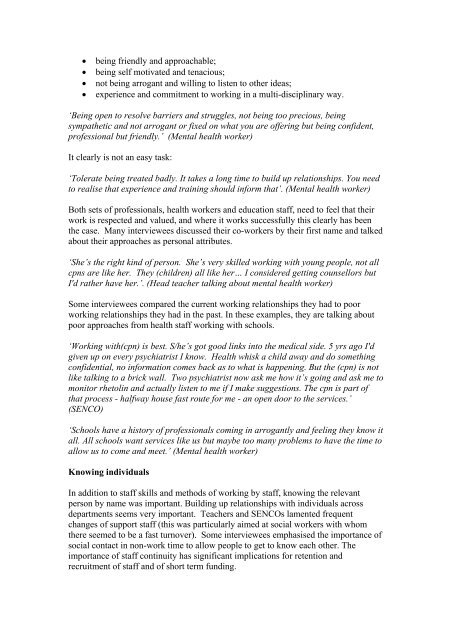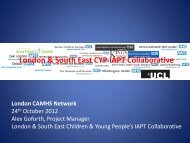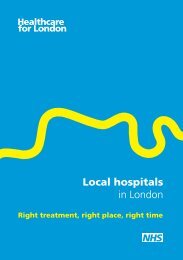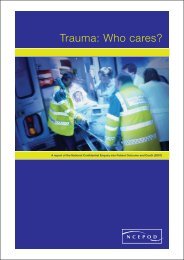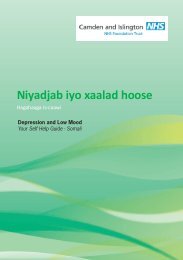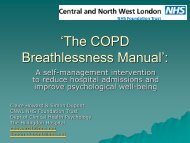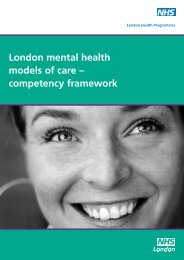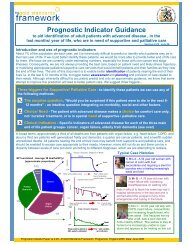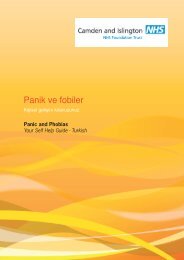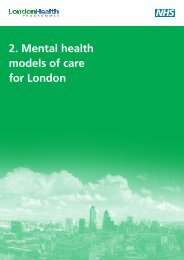(CAMHS) and Schools - London Health Programmes
(CAMHS) and Schools - London Health Programmes
(CAMHS) and Schools - London Health Programmes
You also want an ePaper? Increase the reach of your titles
YUMPU automatically turns print PDFs into web optimized ePapers that Google loves.
• being friendly <strong>and</strong> approachable;<br />
• being self motivated <strong>and</strong> tenacious;<br />
• not being arrogant <strong>and</strong> willing to listen to other ideas;<br />
• experience <strong>and</strong> commitment to working in a multi-disciplinary way.<br />
‘Being open to resolve barriers <strong>and</strong> struggles, not being too precious, being<br />
sympathetic <strong>and</strong> not arrogant or fixed on what you are offering but being confident,<br />
professional but friendly.’ (Mental health worker)<br />
It clearly is not an easy task:<br />
‘Tolerate being treated badly. It takes a long time to build up relationships. You need<br />
to realise that experience <strong>and</strong> training should inform that’. (Mental health worker)<br />
Both sets of professionals, health workers <strong>and</strong> education staff, need to feel that their<br />
work is respected <strong>and</strong> valued, <strong>and</strong> where it works successfully this clearly has been<br />
the case. Many interviewees discussed their co-workers by their first name <strong>and</strong> talked<br />
about their approaches as personal attributes.<br />
‘She’s the right kind of person. She’s very skilled working with young people, not all<br />
cpns are like her. They (children) all like her… I considered getting counsellors but<br />
I'd rather have her.’. (Head teacher talking about mental health worker)<br />
Some interviewees compared the current working relationships they had to poor<br />
working relationships they had in the past. In these examples, they are talking about<br />
poor approaches from health staff working with schools.<br />
‘Working with(cpn) is best. S/he’s got good links into the medical side. 5 yrs ago I'd<br />
given up on every psychiatrist I know. <strong>Health</strong> whisk a child away <strong>and</strong> do something<br />
confidential, no information comes back as to what is happening. But the (cpn) is not<br />
like talking to a brick wall. Two psychiatrist now ask me how it’s going <strong>and</strong> ask me to<br />
monitor rhetolin <strong>and</strong> actually listen to me if I make suggestions. The cpn is part of<br />
that process - halfway house fast route for me - an open door to the services.’<br />
(SENCO)<br />
‘<strong>Schools</strong> have a history of professionals coming in arrogantly <strong>and</strong> feeling they know it<br />
all. All schools want services like us but maybe too many problems to have the time to<br />
allow us to come <strong>and</strong> meet.’ (Mental health worker)<br />
Knowing individuals<br />
In addition to staff skills <strong>and</strong> methods of working by staff, knowing the relevant<br />
person by name was important. Building up relationships with individuals across<br />
departments seems very important. Teachers <strong>and</strong> SENCOs lamented frequent<br />
changes of support staff (this was particularly aimed at social workers with whom<br />
there seemed to be a fast turnover). Some interviewees emphasised the importance of<br />
social contact in non-work time to allow people to get to know each other. The<br />
importance of staff continuity has significant implications for retention <strong>and</strong><br />
recruitment of staff <strong>and</strong> of short term funding.


